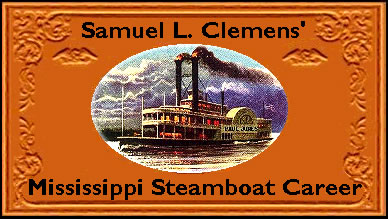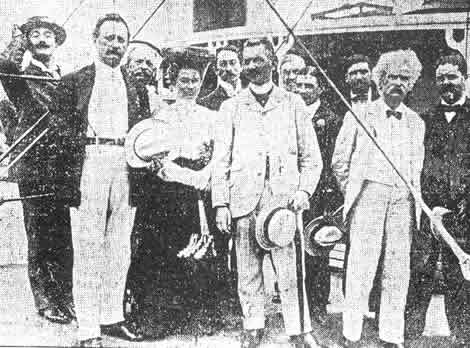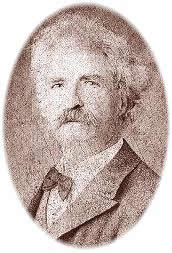 |
|
| FAREWELL - 1902 |
In June 1902 Clemens paid his final visit to the Mississippi River when he accepted an honorary degree at the University of Missouri in Columbia and helped dedicate a steamboat named in his honor. He "preached" in the Baptist Church at Hannibal. At St. Louis, he made a speech (see the text below) at the dedication of the steamboat MARK TWAIN and later attended an unveiling for a memorial marker to writer Eugene Field.
Steamboat: MARK TWAIN
originally named ELON G. SMITH;
renamed CITY OF ST. LOUIS while a harbor boat there;
renamed MARK TWAIN in 1902 to celebrate his visit
Built: 1873
Fate: replaced in 1907 by ERASTUS WELLS
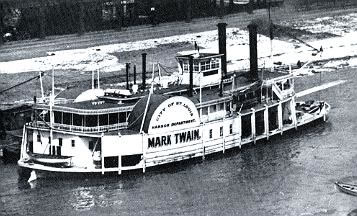
photo from the Dave Thomson collection
|
The St. Louis Globe-Democrat, June 7, 1902, page 1 FRENCH VISITORS AFLOAT.
With Mark Twain at the wheel and the flags of France and the United States flying in the sunshine, the descendants of Lafayette and Rochambeau were on the Mississippi yesterday as the guests of the city of St. Louis and the directors of the World's Fair. The old in years but ever young chronicler of the old days on the river steered the boat with the easy nonchalance of experience and his face illumined with joy in the memories of the past. It was 12:20 o'clock when Matt Tully surrendered the wheel to the author, and in a few minutes the bow and pilot house were crowded with spectators of the novel sight. With his hat on the back of his head and his gray locks flowing in the wind, he looked fixedly at his "mark" and turned and re-turned the massive spokes. After a few moments of silence in the pilot house and laughing applause on the deck, the distinguished pilot sang out in the long, weird cry of the riverman for his "larboard lead," and a deck hand dropped the line into the water. Then the long, lingering song of the deck hand announced the depths, and in the same tone an manner a man on the roof passed the word: "Mark three-e-e-e," came from the deck. "Mark three-e-e-e," echoed the word-passer. "Ha-a-a-alf twa-a-ain," from below. "Ha-a-a-alf twa-a-ain," from above. "Quarter tw-a-a-ain," from the deck. "Quarter twa-a-ain," from the wheel. "Ma-a-a-a-ark twa-a-a-a-ain," from the leadsman, and "Ma-a-a-ark twa-a-a-a-ain," from the pilot, as cheers went up from the onlooking guests and the crew, who had grouped themselves on the deck. "That's good enough water for any one," said Dr. Clemens; "you couldn't improve it without putting in a little whisky." For about fifteen minutes the wheel was in his charge, and then as he said everything looked safe, he permitted Matt Tully to do the steering again. Count Rochambeau went into the wheelhouse to express to Dr. Clemens his pleasure at the privilege of seeing him following the vocation of former days. The conversation between the boat's most distinguished passengers was most interesting. "Hello, count," said Mr. Clemens, "come over here and sit on this bench beside me." His gesture conveyed his meaning to the nobleman and they both sat down. They partially reclined on the bench, elbow to elbow, for fully twenty minutes, but neither uttered a word. Dr. Clemens explained this afterward by saying that although he knew enough French to get along "in a sort of a way," his French is not aristocratic, and he feared to try it on the nobility of France. The day on the Mississippi was most delightful. All seemed to appreciate the significance of having the grandsons of the great French generals of the revolution riding on the bosom of the river which a French pioneer had first explored, enjoying the hospitality of the French-founded metropolis, and the exposition that is to commemorate the American acquisition of the trans-Mississippi continent of France. The start was made from the foot of Market street at 11:30 yesterday morning. The time before the luncheon was devoted to sightseeing and conversation, the incident of the author at the wheel being the only feature in which all the company took part. Lunch was served in the main cabin at 2:15, the procession to the tables being led by the Countess de Rochambeau on the arm of the President D. R. Francis; M. Lagrave, the French commissioner general, escorted by Mr. Lee; Count de Rochambeau and Mr. W. H. Thompson, Dr. Clemens and Mayor Wells, Count de Lafayette and D. C. Nugent. The only other diner at the president's table was the indispensable interpreter, Alexander N. De Menil. He has been the one essential personage of the entertainment of the Rochambeau party. He was the medium through which the visitors learned the views of their hosts and the hosts the wishes of the guests. At all the oratorical interchanges of compliments he has translated the speeches of the foreigners, and did it in a way that brought grateful thanks from the authors of the sentiments. The dinner was elaborate and tasteful. The cabin was decorated with the flag of France on one side, the colors of the World's Fair on the other and the stars and stripes on the large wall at the foot of the lines of tables. The St. Louisans and the visitors had become well acquainted by that time, and an informal spirit of ease pervaded the hall. President Francis acted as toastmaster and opened the period of speeches with a toast to President Loubet. The event of the day was the christening of the harbor boat by the countess, after a toast to the humorist by Mayor Wells. She arose from her seat at the table and broke a bottle of champagne on the forward deck as she gave the craft the name of Mark Twain. This led to a brilliant response by the author of "Life on the Mississippi." Important addresses were also delivered by M. Lagrave, M. Guillemin, Alexander De Menil and Pierre Chouteau. To Gov. Francis' toast to president Loubet the response was made by Commissioner General Lagrave, who proposed the health of President Francis. President Francis introduced Mayor Wells as "the man of whom we are most proud in the Mississippi valley." The mayor extended a graceful welcome to the gentlemen of France, and also gave the greeting of the municipality to Mark Twain, "who has brought so much sunshine and gladness into our American homes, whose early days in this locality were so eventful to the place that the very river seemed to laugh and ripple in glee at having him again riding on its surface." Then the countess christened the boat, and the "Star-Spangled Banner" was sung by the risen diners. Cheers followed cheers when Mark Twain essayed to respond. It was several moments before he could begin, but when he did it was to give an inimitably humorous yet interestingly apropos address. Mr. Chouteau made a short address, saying that St. Louis was a daughter which France had given to this country with the Louisiana territory as her dowry. M. Guillemin spoke in English in appreciation of St. Louis and Mark Twain. Mr. De Menil paid an eloquent tribute to the memory of Lafayette, and President Francis closed the speaking with the statement that Mayor Wells had assured him that the next streets to be named in St. Louis would bear the names of the individuals of the Rochambeau party. The boat had reached its dock before the close of the speaking. Most of the company went immediately to the ceremony of the unveiling of the Eugene Field tablet and others went to the rooms of the Latin-American club, where they were entertained. Addresses were delivered by Commissioner Lagrave and James Arbuckle. The foreign contingent passed the evening informally. They left for Chicago at 11:40 o'clock on the Alton last night. M. La Grave will sail for France on the 20th of this month, not to return until next May. The members of the French embassy will go to Washington from Chicago. The Rochambeau party, as originally constituted, will go from Chicago to Colorado Springs, thence to Salt Lake City, Yellowstone park and San Francisco. They will return East by way of Canada, sailing form Montreal. |
|
TWAIN'S SPEECH AT THE CHRISTENING OF THE The Countess de Rochambeau christened the St. Louis harbor-boat Mark Twain in honor of Mr. Clemens, June 6, 1902. Just before the luncheon he acted as pilot. "Lower away lead!" boomed out the voice of the pilot. " Mark Twain, quarter five and one-half-six feet!" replied the leadsman below. "You are all dead safe as long as I have the wheel--but this is my last time at the wheel." At the luncheon Mr. Clemens made a short address. FIRST of all, no--second of all--I wish to offer my thanks for the honor done me by naming this last rose of summer of the Mississippi Valley for me, this boat which represents a perished interest, which I fortified long ago, but did not save its life. And, in the first place, I wish to thank the Countess de Rochambeau for the honor she has done me in presiding at this christening. I believe that it is peculiarly appropriate that I should be allowed the privilege of joining my voice with the general voice of St. Louis and Missouri in welcoming to the Mississippi Valley and this part of the continent these illustrious visitors from France. When La Salle came down this river a century and a quarter
ago there was nothing on its banks but savages. He opened up this great
river, and by his simple act was gathered in this great Louisiana territory.
I would have done it myself for half the money. Related story in The New York Times, June 7, 1902 contains a more extensive text of the speech. |
(With his own hands Dr. Samuel L. Clemens steered the St. Louis harbor boat, rechristened Mark Twain, up the Mississippi River today.--St. Louis press dispatch.) There
was cryin' and cursin', but Mark yelled out, Through
the thick, black smoke of the harbor boat But
soon as they run the gang plan out (Chicago Tribune, June 11, 1902, p. 4) |
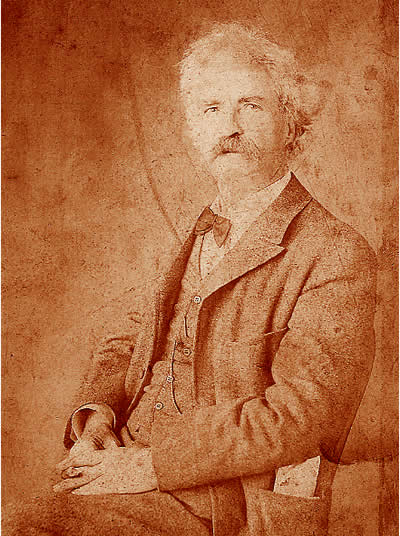
Portrait of Clemens by Robertus Love, 1902
courtesy of Dave Thomson.
Written on the back of the original photo:
"Property of Robertus Love
426 Central Park West
Photo at P-D off
May 29, 1902"
Photograph taken in office of St. Louis Post-Dispatch,
May 29, 1902, the day Mark Twain went to
Hannibal for the last time.
Index | Intro | Cub Pilot | Licensed Pilot | River Tour 1882 | 1902 Farewell | Steamboat Men | Glossary

Quotations | Newspaper Articles
| Special Features |
Links | Search
